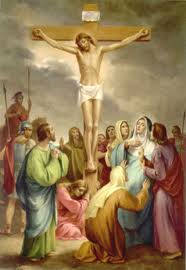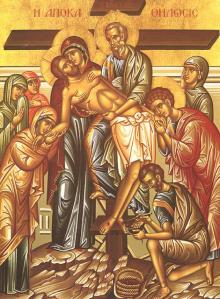 The Psalm of the Cross
The Psalm of the Cross
Today is Good Friday and on this day, 2000-odd years ago, the most famous event to ever break in to human history took place – and we can, of course, read the Gospel accounts of the crucifixion of Jesus to marvel at the sacrifice that Jesus made on the Cross for us. There is another place in the Bible, however, that we can go to for a deeply intimate account of what happened that day – Psalm 22. C.H. Spurgeon, in his Treasury of David says:
“This is beyond all others the Psalm of the Cross. It may have been repeated word by word by our Lord hanging on the tree… It is the photograph of our Lord’s saddest hours, the record of His dying words… Before us we have a description both of the darkness and the glory of the Cross, the sufferings of Christ and the glory that shall follow. Oh for grace to draw near and see this great sight! We should read reverently, putting off our shoes from off our feet, as Moses did at the burning bush, for if there be holy ground anywhere in Scripture it is in this psalm.”
Matthew 27:46 records Jesus’ cry of Psalm 22:1 so that we can see the predictions of Christ’s sufferings had come true: ‘My God, my God, why have you forsaken me?’
A Trinitarian Event
Verses 1 and 2 of Psalm 22 give us an intimate insight into the pain that the Son suffered as he was forsaken by the Father – and this is important – the Cross is, above all, a Trinitarian event. It isn’t merely the carnal sufferings of a man. It is far, far beyond that. It strikes at the very heart of our God and the very nature of reality. The Father, Son and Holy Spirit – the eternal community of persons, united in a perfect love – being torn apart on the Cross. How can this happen? If we think the suffering on the Cross is confined to the Son, we are seriously mistaken. The Father, forsaking the Son, suffers the pain of Sonlessness. The Son, being forsaken by the Father, suffers the pain of Fatherlessness. And the Spirit, who carries out the act of forsaking (Heb 9:14), suffers the pain of the breakdown of the relationship in which he has eternally delighted. But surely such an event would have catastrophic consequences; as the Son, who has been in eternal, loving communion with the Father and the Spirit was forsaken, surely the very foundation of reality was being rocked. Is that what we see as Jesus breathes his final breath on the Cross? The earth shook and the rocks split! (Matthew 27:51).
 But the Cross is more than just a tragic story of suffering. The Cross reveals to us who our God is. 1John 4:16 tells us that ‘God is love’. This is quite a revelation. It isn’t telling us that love is just one characteristic that we can attribute to our Triune God, but rather that the very nature of Father, Son and Spirit is… love! And how is love displayed on the Cross? It reveals to us something very special about the nature of love – it is fundamentally self-sacrificial. The most immediate display of self-sacrifice is readily observable in the sufferings of Christ, which Psalm 22 attests to in detail. Verses 6-18 describe to us the degradation that Jesus felt, the mocking and insults he endured, his feelings of helplessness, his bones put out of joint, the dryness of his mouth, his garments that were divided (John 19:23-24), and of course his pierced hands and feet as he was nailed to the Cross. Jesus endured this terrible suffering as a self-sacrificial act of love in order that he might make atonement for our sin and deliver us into the loving bosom of the Father. And being the image of his Father (Colossians 1:15), he reveals the very eternal nature of his Father to us on the Cross – eternally self-sacrificial. C. E. Rolt comments that God’s ‘entire being can be summed up in one word; self-sacrifice.’ The God who is love defines exactly what love is and that is why Jesus says in John 15:13: ‘Greater love has no one than this, that he lay down his life for his friends.’
But the Cross is more than just a tragic story of suffering. The Cross reveals to us who our God is. 1John 4:16 tells us that ‘God is love’. This is quite a revelation. It isn’t telling us that love is just one characteristic that we can attribute to our Triune God, but rather that the very nature of Father, Son and Spirit is… love! And how is love displayed on the Cross? It reveals to us something very special about the nature of love – it is fundamentally self-sacrificial. The most immediate display of self-sacrifice is readily observable in the sufferings of Christ, which Psalm 22 attests to in detail. Verses 6-18 describe to us the degradation that Jesus felt, the mocking and insults he endured, his feelings of helplessness, his bones put out of joint, the dryness of his mouth, his garments that were divided (John 19:23-24), and of course his pierced hands and feet as he was nailed to the Cross. Jesus endured this terrible suffering as a self-sacrificial act of love in order that he might make atonement for our sin and deliver us into the loving bosom of the Father. And being the image of his Father (Colossians 1:15), he reveals the very eternal nature of his Father to us on the Cross – eternally self-sacrificial. C. E. Rolt comments that God’s ‘entire being can be summed up in one word; self-sacrifice.’ The God who is love defines exactly what love is and that is why Jesus says in John 15:13: ‘Greater love has no one than this, that he lay down his life for his friends.’
‘The Joy Set Before Him’
Hebrews 12:2 tells us that Jesus, ‘for the joy set before Him endured the Cross, scorning its shame.’ Jesus undoubtedly endured the Cross thinking of ‘the joy set before him,’ which we can read about in Psalm 22:22-31. Jesus’ hope is that his sufferings will lead to praise of the Father (Psalm 22:22-31 with Hebrews 2:10-12). And through it all Jesus knows that the Father does not despise or hold any disdain for ‘the suffering of the afflicted one’ (v.24). In fact, the Father is intimately concerned for the Son as he is afflicted on the Cross: ‘He has not hidden his face from him but has listened to his cry for help’ (v.24).
But the ultimate joy set before Jesus is revealed in verses 25-31 where he describes a great assembly of which Jesus is a part. All kinds of people from all over the world, all the saints who put their trust in Jesus, will be part of this assembly; all the nations of the world (v.27-28), including the rich and the poor (v.26, v.29). Not only that, but the dead, ‘those who go down to the dust… who cannot keep themselves alive’ (v.29) will be resurrected to kneel in worship (Psalm 22:29 with Matthew 27:52-53). Of course, the event that Jesus is referring to is the day of the resurrection, the day the Son is glorified!
The Future Generations
In verses 30-31 Jesus turns his thoughts to the future generations of believers who will be saved through the act of loving sacrifice on the Cross and be brought into the eternal, loving life of the Trinity. The Cross, therefore, not only signifies a great saving-sacrifice, but it reveals to us just who we are saved for. As Mike Reeves says: ‘To know and grow to enjoy him is what we are saved for.’
See also:
Part II: The Glorified Son (Psalm 23)
Part III: The Ascended Son (Psalm 24)

[…] Christ: Sun of Righteousness For you who revere my name, the Sun of Righteousness will rise with healing in his wings (Mal 4:2) HomeAbout Twitter Facebook RSS Feed ← Day 1: The Forsaken Son (Psalm 22) […]
[…] were previously written about in the Law of Moses, the Prophets and the Psalms. Having seen how Psalm 22 speaks of the Crucifixion and Psalm 23 speaks of the Resurrection – giving us an intimate account of both – we […]
Reblogged this on Christ: Sun of Righteousness.
[…] day Jesus was crucified on the Cross, revealing the self-sacrificial nature of the Triune God. As we saw in Psalm 22, Jesus took great comfort in the ‘joy set before him’ – that joy that was set before him is […]
[…] crucifixion, resurrection and ascension as found in Psalms 22, 23, and 24 can be found here, here and […]